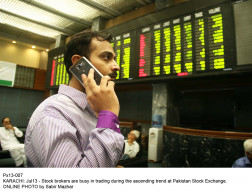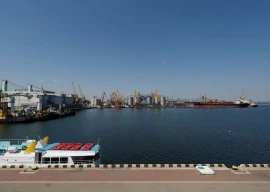
He was speaking at a briefing to parliamentarians in Islamabad, which was focused on “sensitising political leaders”.
The revelation comes days before an International Monetary Fund (IMF) team visits Islamabad. The team, due to arrive on January 30, will review possibilities to restore the $11.3-billion bailout programme which was suspended in July after Pakistan failed to reform its bleeding power sector and levy a reformed General Sales Tax.
The government’s team told the parliamentarians that during the first six months, spending on defence, debt servicing and subsidies had increased manifold, Senator Professor Khurshid Ahmed said, after attending the meeting. “Only on defence, the spending exceeded the July-December target by 35 per cent,” he said.
The government has allocated Rs442 billion to defence and has also approved a supplementary grant of Rs10 billion. Experts fear that by end of June, defence spending might go beyond Rs500 billion due to the ongoing fight against militants.
“We are giving [these] briefings transparently in order to build a consensus on the economic reforms agenda aimed at stimulating growth and creating more jobs,” Shaikh said.
However, in his first such public admission, he spoke about the grave economic situation. “If business continues as usual and tough decisions are not made, the budget deficit could be eight per cent of the total size of the economy [Rs1.37 trillion],” Shaikh said. At the same time, he said, the government would take every possible step to not let the deficit slip to that extent.
According to a finance ministry official, failure to implement power sector reforms will put an additional burden of Rs256 billion this fiscal year.
Earlier, the government had agreed with the IMF that it would restrict the budget deficit to Rs685 billion, which is four per cent of the total size of the economy. Later on, the IMF relaxed the target to 4.7 per cent to account for additional flood-related expenditure.
Senator Professor Khurshid Ahmed said that the finance ministry’s internal sources put the budget deficit at 7.7 per cent of the total size of the economy. “The government did not discuss the means to finance the budget deficit of over eight per cent of the GDP [Rs1.4 trillion],” he said.
“Other than exports and remittances, Pakistan lags behind in the yearly targets of the sectors of agriculture, industry and services,” Ahmed said.
He said that he has advised the government to tackle corruption and control tax evasion instead of levying new taxes. “Pakistan is losing Rs300 to Rs600 billion annually because of corruption and Rs750 billion to tax evasion,” he claimed.
In another meeting, the government briefed parliamentarians on the petroleum pricing mechanism.
The parliamentarians questioned the formula being used to change prices, said Muttahida Qaumi Movement’s (MQM) Khawaja Suhail Mansoor. “The government is changing prices on the basis of the Gulf Oil formula which is ten dollars more expensive per barrel than the New York market-based formula,” he said. Suhail said that on Tuesday, the New York market price was $86.4 per barrel while the Gulf market rate was almost $97 per barrel.
An official of the petroleum ministry said the parliamentarians have been told that if the government did not increase petroleum prices next month, it would put an additional burden of Rs7 billion on the national exchequer. “The total impact of freezing the oil prices from January would come to Rs12 billion,” he said.
Published in The Express Tribune, January 26th, 2011.

















COMMENTS (10)
Comments are moderated and generally will be posted if they are on-topic and not abusive.
For more information, please see our Comments FAQ